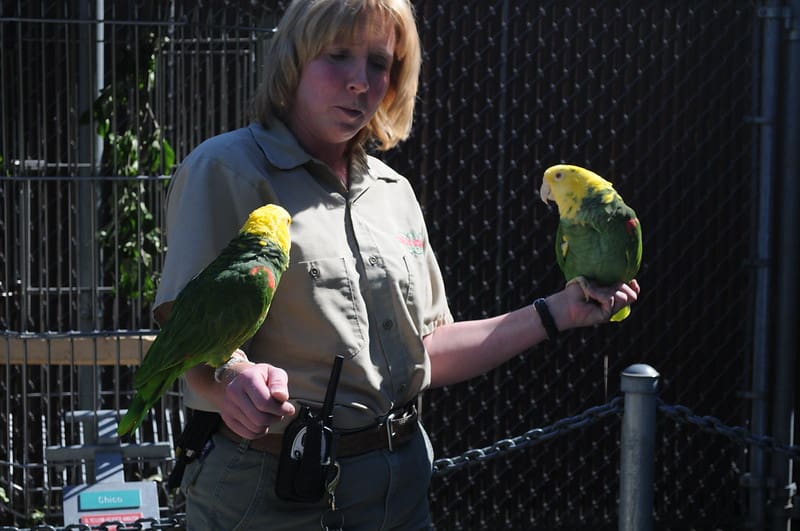
Are you a middle school or high school student with a passion for animals and a desire to work closely with them? If so, a career at a zoo might be the perfect fit for you! Zoos offer a wide range of exciting and rewarding career opportunities that allow you to make a meaningful impact on wildlife conservation and education. In this article, we will list a few of the key positions that you can pursue with a career at the zoo and guide you through the steps to get involved in the world of zoos and explore the various paths you can take to pursue your dream career. Get ready to embark on a thrilling journey into the wild world of zoo careers!
Potential Career Opportunities at a Zoo
When it comes to working with animals at a zoo, there are various job roles that cater to different aspects of animal care, conservation, education, and research. Here are some of the key positions you can pursue:
Zookeeper/Animal Care Specialist
Zookeepers are responsible for the daily care and well-being of the animals in the zoo. They feed and provide water to the animals, clean their enclosures, monitor their health, and ensure their overall welfare. Zookeepers also engage in enrichment activities, behavioral observation, and training programs to promote the physical and mental stimulation of the animals in their care.
Wildlife Educator/Interpreter
Wildlife educators or interpreters play a crucial role in connecting zoo visitors with animals. They design and deliver educational programs, presentations, and guided tours to inform visitors about the animals, their habitats, conservation issues, and the importance of wildlife protection. They engage audiences of all ages and inspire a love for animals and the natural world.
Wildlife Veterinarian
Wildlife veterinarians specialize in the medical care of zoo animals. They diagnose and treat illnesses, perform surgeries, conduct regular check-ups, and oversee preventive healthcare measures. Wildlife veterinarians work closely with zookeepers and animal care staff to ensure the overall health and well-being of the animals in their care.
Animal Behaviorist
Animal behaviorists study and analyze the behavior of zoo animals to better understand their social dynamics, communication patterns, and natural instincts. They design enrichment programs, behavioral modification plans, and conduct research to improve animal welfare and enhance the quality of life for zoo animals.
Wildlife Conservationist
Wildlife conservationists work on the preservation and protection of endangered species. They collaborate with zoo staff, conservation organizations, and government agencies to develop and implement conservation programs. Conservationists focus on habitat restoration, captive breeding programs, research initiatives, and community engagement to promote the conservation of species both in zoos and their natural habitats.
Animal Curator
Animal curators oversee the management and care of the animal collection in the zoo. They work closely with zookeepers, veterinarians, and conservationists to ensure the appropriate selection, acquisition, and placement of animals. Curators also develop and implement animal care policies, manage breeding programs, and coordinate animal transfers between zoos for genetic diversity.
Aviculturist or Herpetologist
Aviculturists specialize in the care and breeding of birds, while herpetologists focus on reptiles and amphibians. They design and maintain appropriate enclosures, monitor breeding programs, conduct research, and provide specialized care for these specific animal groups.
Wildlife Researcher
Wildlife researchers conduct scientific studies and research projects related to animal behavior, reproduction, genetics, ecology, and conservation. They collect and analyze data, publish findings, and contribute to the overall understanding of animals and their ecosystems. Research findings help shape zoo management practices and conservation strategies.
These are just a few examples of the many job roles available for those interested in working with animals at a zoo. Each role plays a crucial part in ensuring the well-being of animals, educating the public, and contributing to wildlife conservation efforts.
Steps to Work Towards a Zoo Career
Explore Your Passion
The first step towards a zoo career is to explore your passion for animals and the natural world. Read books, watch documentaries, and visit your local zoo to gain a deeper understanding of different species and their habitats. Volunteer at animal shelters, conservation organizations, or wildlife rehabilitation centers to gain hands-on experience and develop a sense of empathy towards animals.
Focus on Education
Education plays a vital role in zoo careers. Concentrate on your studies, particularly in science-related subjects such as biology, zoology, and environmental sciences. Strong communication and writing skills are also essential, as many zoo careers involve interacting with visitors, conducting research, and writing reports. Take advantage of school science fairs, clubs, and programs that promote an understanding of wildlife and conservation.
Gain Experience through Internships
Internships provide valuable hands-on experience and a glimpse into the daily operations of a zoo. Many zoos offer internship programs specifically designed for students. These opportunities allow you to work alongside zookeepers, educators, and conservationists, gaining practical skills and insight into various aspects of zoo management. Internships also help you network with professionals in the field, potentially opening doors for future job opportunities.
Pursue Higher Education
While not all zoo careers require a college degree, further education can significantly enhance your prospects and knowledge base. Consider pursuing a degree in a field related to animal sciences, wildlife biology, conservation, or zoology. Higher education provides a deeper understanding of animal behavior, ecology, and conservation strategies, which are crucial for many zoo positions.
Specialize in a Field of Interest
Zoo careers offer a diverse range of specializations. Identify the area that interests you the most and focus your efforts on gaining expertise in that field. Whether you aspire to be a zookeeper, an animal behaviorist, a wildlife veterinarian, an educator, or a conservation biologist, seek out opportunities that align with your chosen career path. Participate in research projects, attend workshops, and seek mentorship from professionals working in your desired field.
Volunteer at Zoos
Volunteering at a zoo provides hands-on experience and helps you build a strong foundation for your future career. Many zoos offer volunteer programs for students. By assisting zookeepers, participating in educational programs, or working in horticulture and landscaping, you’ll gain valuable insights into zoo operations and develop important skills such as animal care, public speaking, and teamwork.
Network and Seek Mentorship
Building a network of professionals in the field can greatly benefit your career journey. Attend conferences, workshops, and seminars related to zookeeping, conservation, and animal welfare. Connect with experts, ask questions, and seek mentorship from professionals who inspire you. Their guidance and support can provide valuable advice and open doors to future opportunities.
Continual Learning
The field of zoos and wildlife conservation is ever-evolving. Stay updated on the latest research, advancements in animal care, and conservation initiatives. Subscribe to scientific journals, follow reputable organizations, and engage with online communities focused on animal welfare and conservation. Embrace a lifelong commitment to learning and growth to stay at the forefront of the field.
A career in the world of zoos is an exciting and fulfilling path for middle school and high school students passionate about animals and conservation. By exploring your passion, focusing on education, gaining practical experience, and seeking mentorship, you can pave the way towards a rewarding career that allows you to make a positive impact on wildlife and inspire others to appreciate the wonders of the natural world. So, let your love for animals guide you as you embark on a thrilling journey into the wild world of zoo careers!




